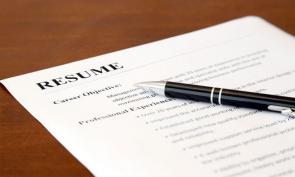
A legal resume should be concise, accurate, error-free, well organized, clear, easy to read, and visually appealing. Your resume will probably be reviewed in no more than 30 seconds by the reader. If you want your resume to be effective, you must keep it short but offer enough relevant information to interest the employer. One page is typically the length of a law student's resume.
The quality of your law school resume can have a significant impact on your admission to law school. By highlighting unique factors and supplementing your personal statement, it may enhance your application. It takes time and effort to prepare an effective law school resume. We discuss how you can create a great law school resume, provide a few extra tips, and provide a sample and template you can use to create your own.
What is A Law School Resume?
Creating a law school resume emphasizes many students' academic achievements for admission to a law school. Law schools generally require resumes, though not all do. If you do it right, it can highlight the achievements and skills law schools are looking for in students and make you stand out from the rest.
How to Create a Law School Legal Resume
To create the perfect law school legal resume, follow the basic steps below. You should only include experiences and accomplishments from your college years and after.
1. Use the Right Structure
Section headings should be included in your format. You should provide dates and locations for each activity in bullet points for each section. The most recent activities should come first, in reverse chronological order.
2. Use the Right Format
Choose a font, from the multiple fonts, that is easy to read, such as Calibri or Helvetica, and a size that is easy to read. Generally, the optimal size is between 10 and 12 points. The top, bottom, and left and right margins should be one inch.
3. Use an Appropriate Length
It is generally suggested that you limit your resume to one or two pages, even if you go into more detail than you would in a typical employment resume. Nevertheless, you will want to make sure you check with the law school to which you are applying to find out what length they prefer for resumes.
4. Include Your Name and Contact Information
The heading of your resume should include your name, current address, telephone number, and e-mail address. The name can be bolded or the largest font on the page, but should not be larger than 14 points.
5. Add Your Educational Experience
Indicate where you attended college and where it was located. Your major should be included as well as the degree you earned. Provide the dates that you attended school there even if you did not earn a degree or certificate. Also, if you studied abroad, you can include that. Your overall undergraduate GPA should be included.
6. List Your Law School Honors, Awards, and Scholarships.
Describe any scholarships, honors, class rank, and awards you received during college, as well as the years when you received them. Dean's list, academic distinctions like Summa Cum Laude, and scholarships are examples of accomplishments you might want to include.
7. List Your Internship and Legal Experience
Your previous employment and internship experience should be listed. You should include your title, the name of the employer, the location, and the dates you worked there. Your responsibilities for each job should be bulleted. Make sure each bullet point begins with strong action words such as led, organized, or mentored. Be sure to quantify your results as much as possible, for example, "Increased sales by 20% in my first year." List your experiences in reverse chronological order, from most recent to oldest.
8. List Volunteer Work and Leadership Organizations
List your volunteer experiences and leadership positions with the organization, community service, extracurricular activities, dates you served, and the duties you performed if you served in an organization during college. You should follow the same chronological order as your employment history.
- See 6 Things Attorneys and Law Students Need to Remove from Their Resumes ASAP If They Want to Get Jobs with the Most Prestigious Law Firms for more information.
Tips for Creating a Law School Resume
You can strengthen your law school resume by following these tips:
Format Consistently: Consistently format your resume and pay attention to its formatting. When adding periods to descriptions, add them to all of your descriptions or leave them out entirely.
Use Simple Explanations: It proves that you understand the industry for which you are applying, so it is appropriate for employment resumes. The admissions committee, however, may become confused. If you use special terminology or acronyms, explain them simply or include a short definition.
Include Details About Your Academic Performance: Include not only your GPA and honors such as the Dean's List but also your thesis title and any significant research you have completed.
Proofread Thoroughly: Re-read your resume several days after you have completed it with fresh eyes. As a result, you will be more likely to catch typos and grammatical errors you would otherwise overlook. You can also ask a friend or family member to look for typos as well as formatting errors on your resume.
See the following articles for more information:
- A Resume Must Tell the Whole Story
- What Should I Put on My Attorney Resume?
- 6 Things Attorneys and Law Students Need to Remove from Their Resumes ASAP If They Want to Get Jobs with the Most Prestigious Law Firms
- Attorney Resume Writing Tips
Law School Resume Template
For creating your own resume, here is a template. You should emphasize education, leadership, volunteer work, and membership in organizations on an excellent law school resume.
Name
123 Street
City, State 123456
email@gmail.com
EDUCATION
UNIVERSITY, City, State
Degree, Graduation date
- Overall GPA
- Academic achievements, moot court, honors, and scholarships
COURSES
- Relevant courses
PROFESSIONAL EXPERIENCE
Title
Business Name, Years
- Primary duties
- Primary duties
- Primary duties
Business Name, Dates
- Primary duties
- Primary duties
- Primary duties
VOLUNTEER EXPERIENCE
NAME OF ORGANIZATION, Title, or committee you served on
Years you served
- Primary responsibilities
- Primary responsibilities
- Primary responsibilities
Law School Legal Resume Example
Here is an example of a law school resume:
Julie Myers
523 Main Street
Kansas City, MO 64163
Julie.Myers@gmail.com
EDUCATION
WILLIAM JEWELL COLLEGE, Liberty, MO
Bachelor of Science in Criminal Justice, June 2019
- Graduated with a 3.9 GPA
- Made the Dean's List four times
- Criminal Law, Federal Jurisdiction
- Ethics, Business Law, Advanced Legal Research
- International Law, Commercial Law
File Clerk
Lansing Law Group, 2017-2019
- Began as an unpaid clerk and transitioned to paid position within 8 weeks based on assertiveness and performance
- Researched cases, wrote filing summaries, and made presentations to attorneys regarding cases
- Filed correspondence and other documents and filed ad hoc assignments
File Clerk Intern
Lansing Law Group, Summer 2017
- Filed correspondence for cases in real estate and criminal matters
- Fielded phone calls and scheduled appointments for attorneys
- Provided client reception and assisted clients with paperwork
VOLUNTEER EXPERIENCE
HABITAT FOR HUMANITY, Service Committee
2017-2019
- Organized students on campus to perform local building projects
- Developed and maintained close relationships with the leaders in all major on-campus organizations to coordinate volunteer efforts
- Doubled the number of volunteers from 2017 to 2018
Click Here to View Sample Legal Resumes.
Read Also: How Attorneys and Law Students Should Write a Legal Resume: Resume Examples, Suggestions, and Resources
The 9 Best Tips for Writing a Legal Resume
A lawyer or paralegal applying for a position at a law firm or corporate legal department may find it difficult to write a resume. Consider whether certain information should be included and how the components should be ordered. Are flashy designs helpful or harmful to your chances of success? These tips for writing legal resumes will help you land the job you want:
1. Keep It Short and Sweet
Be concise when writing resumes. Legal hiring managers scan resumes quickly, and unnecessary words can bury the things that distinguish you from other candidates. In the case of more than five years of experience, you do not have to limit the document to one page. However, do not make it too long. Each word should highlight your strengths by highlighting your best qualities. For new attorneys preparing their first professional résumé, the structured Attorney Resume Guide provides clarity on what employers prioritize most.
2. Education or Experience First? It Matters!
The length of your career will determine whether you begin your resume with legal education or experience. Those with at least three years of experience in law or paralegal work should emphasize their expertise. You should start by completing your education if you are a new associate. Despite working for a few years, if your law school is a top-tier one, you might consider starting with your education. In any section you choose, you should describe your career in reverse chronological order: put the most recent education or experience at the top.
3. Provide A Brief Narrative With Action Verbs
Do not use vague or wishy-washy verbs such as performed, assisted, or conducted. Use words like studied, analyzed, solved, and negotiated to describe the activities you carried out. Consider your impact as well. Describe the outcomes of your work - you won that $300 million cases because of your skillful work? Do not forget to mention it. How you prepared legal arguments, motions, or agreements to the highest standard of precision, or how you streamlined a file system to make it easier to find specific documents.
4. Tailor Your Resume For Each Job
If you are applying for multiple jobs, you should customize your resume for each one. Research exactly what you will be doing at the job and the kinds of cases you will handle, and edit your resume to reflect the relevant skills that will help you succeed. On the second page of the resume, patent attorneys should list patents they have helped write. Attorneys should list their corporate, real estate, and other transactions without naming their clients. Attorneys can include writing samples and copies of briefs they are particularly proud of.
5. Think Simple Elegant Layout
If you are writing a legal resume, you should avoid unusual colors and graphics. You should avoid using a flashy format for your resume. Use only one font for your document to avoid making it hard to read. Choosing a serif typeface (such as Cambria, Times New Roman, and Garamond) with a clean, neutral background is ideal. You should use bullets, headings, and bold fonts to make your resume easy to scan.
6. Emphasize Relevant Professional Skills
In addition to your native language, mention your proficiency level - basic, conversational, or fluent. Include the language only if you can converse in it. Add any expertise you have outside the legal field, such as computer science or computer forensics, or any other experience you have that makes you stand out, like experience with eDiscovery software.
7. Highlight Your Publications
You should list any articles you have published that relate to the firm's practice area on your resume. You should provide a list of your published works on your resume if you have a broad publishing history.
8. Keep Hobbies And Interests pertinent To The Role
Many legal employers often like to learn about candidates' outside interests because hobbies serve as icebreakers in interviews and show you are a well-rounded individual. Incorporating your interests, add activities showcasing your leadership and self-discipline skills. When listing hobbies and interests, use your best judgment to decide what belongs and what does not. You should also list your memberships in alumni, groups, or legal societies.
9. Proofread And Get Help Reviewing For Typos
You do not want to make someone laugh with your grammatical and spelling errors - especially when you are applying for a legal job. Make sure to read your resume carefully before you send it out, as even a small mistake can lead to your legal job applications being rejected. You can spot changes easier on paper than on a computer screen, so print out a copy to proofread it. Having some friends read through it is even better. Often, they will catch errors you missed.
The purpose of an attorney or paralegal resume is not merely to introduce you to a law firm, but also to demonstrate why your skills are exactly what they are looking for.
Click here to view a collection of attorney resume and cover letter resources such as resume writing advice, overcoming common resume problems, cover letter writing advice, making your resume and cover letter stand out to law firms, keeping your resume updated, and general resume questions and answers written by experienced legal recruiters. For law students preparing to transition from resume building to interviews, read How Attorneys Can Create Winning Resumes and Ace Interviews.
Interested in More Interview Advice? See Our Most Popular Interview Articles:
- The Five Musts of Interviewing
- The Best Way to Prepare for a Job Search and Interviews
- How to Talk About Other Interviews in Your Interviews
- Employers Want to Hire You
- How To Answer The Tell Me About Yourself Interview Questions
About Harrison Barnes
No legal recruiter in the United States has placed more attorneys at top law firms across every practice area than Harrison Barnes. His unmatched expertise, industry connections, and proven placement strategies have made him the most influential legal career advisor for attorneys seeking success in Big Law, elite boutiques, mid-sized firms, small firms, firms in the largest and smallest markets, and in over 350 separate practice areas.
A Reach Unlike Any Other Legal Recruiter
Most legal recruiters focus only on placing attorneys in large markets or specific practice areas, but Harrison places attorneys at all levels, in all practice areas, and in all locations-from the most prestigious firms in New York, Los Angeles, and Washington, D.C., to small and mid-sized firms in rural markets. Every week, he successfully places attorneys not only in high-demand practice areas like corporate and litigation but also in niche and less commonly recruited areas such as:
- Immigration Law
- Workers Compensation
- Insurance
- Family Law
- Trust and Estate
- Municipal law
- And many more...
This breadth of placements is unheard of in the legal recruiting industry and is a testament to his extraordinary ability to connect attorneys with the right firms, regardless of market size or practice area.
Proven Success at All Levels
With over 25 years of experience, Harrison has successfully placed attorneys at over 1,000 law firms, including:
- Top Am Law 100 firms such including Sullivan and Cromwell, and almost every AmLaw 100 and AmLaw 200 law firm.
- Elite boutique firms with specialized practices
- Mid-sized firms looking to expand their practice areas
- Growing firms in small and rural markets
He has also placed hundreds of law firm partners and has worked on firm and practice area mergers, helping law firms strategically grow their teams.
Unmatched Commitment to Attorney Success - The Story of BCG Attorney Search
Harrison Barnes is not just the most effective legal recruiter in the country, he is also the founder of BCG Attorney Search, a recruiting powerhouse that has helped thousands of attorneys transform their careers. His vision for BCG goes beyond just job placement; it is built on a mission to provide attorneys with opportunities they would never have access to otherwise. Unlike traditional recruiting firms, BCG Attorney Search operates as a career partner, not just a placement service. The firm's unparalleled resources, including a team of over 150 employees, enable it to offer customized job searches, direct outreach to firms, and market intelligence that no other legal recruiting service provides. Attorneys working with Harrison and BCG gain access to hidden opportunities, real-time insights on firm hiring trends, and guidance from a team that truly understands the legal market. You can read more about how BCG Attorney Search revolutionizes legal recruiting here: The Story of BCG Attorney Search and What We Do for You.
The Most Trusted Career Advisor for Attorneys
Harrison's legal career insights are the most widely followed in the profession.
- His articles on BCG Search alone are read by over 150,000 attorneys per month, making his guidance the most sought-after in the legal field. Read his latest insights here.
- He has conducted hundreds of hours of career development webinars, available here: Harrison Barnes Webinar Replays.
- His placement success is unmatched-see examples here: Harrison Barnes' Attorney Placements.
- He has created numerous comprehensive career development courses, including BigLaw Breakthrough, designed to help attorneys land positions at elite law firms.
Submit Your Resume to Work with Harrison Barnes
If you are serious about advancing your legal career and want access to the most sought-after law firm opportunities, Harrison Barnes is the most powerful recruiter to have on your side.
Submit your resume today to start working with him: Submit Resume Here
With an unmatched track record of success, a vast team of over 150 dedicated employees, and a reach into every market and practice area, Harrison Barnes is the recruiter who makes career transformations happen and has the talent and resources behind him to make this happen.
A Relentless Commitment to Attorney Success
Unlike most recruiters who work with only a narrow subset of attorneys, Harrison Barnes works with lawyers at all stages of their careers, from junior associates to senior partners, in every practice area imaginable. His placements are not limited to only those with "elite" credentials-he has helped thousands of attorneys, including those who thought it was impossible to move firms, find their next great opportunity.
Harrison's work is backed by a team of over 150 professionals who work around the clock to uncover hidden job opportunities at law firms across the country. His team:
- Finds and creates job openings that aren't publicly listed, giving attorneys access to exclusive opportunities.
- Works closely with candidates to ensure their resumes and applications stand out.
- Provides ongoing guidance and career coaching to help attorneys navigate interviews, negotiations, and transitions successfully.
This level of dedicated support is unmatched in the legal recruiting industry.
A Legal Recruiter Who Changes Lives
Harrison believes that every attorney-no matter their background, law school, or previous experience-has the potential to find success in the right law firm environment. Many attorneys come to him feeling stuck in their careers, underpaid, or unsure of their next steps. Through his unique ability to identify the right opportunities, he helps attorneys transform their careers in ways they never thought possible.
He has worked with:
- Attorneys making below-market salaries who went on to double or triple their earnings at new firms.
- Senior attorneys who believed they were "too experienced" to make a move and found better roles with firms eager for their expertise.
- Attorneys in small or remote markets who assumed they had no options-only to be placed at strong firms they never knew existed.
- Partners looking for a better platform or more autonomy who successfully transitioned to firms where they could grow their practice.
For attorneys who think their options are limited, Harrison Barnes has proven time and time again that opportunities exist-often in places they never expected.
Submit Your Resume Today - Start Your Career Transformation
If you want to explore new career opportunities, Harrison Barnes and BCG Attorney Search are your best resources. Whether you are looking for a BigLaw position, a boutique firm, or a move to a better work environment, Harrison's expertise will help you take control of your future.
Submit Your Resume Here to get started with Harrison Barnes today.
Harrison's reach, experience, and proven results make him the best legal recruiter in the industry. Don't settle for an average recruiter-work with the one who has changed the careers of thousands of attorneys and can do the same for you.
About BCG Attorney Search
BCG Attorney Search matches attorneys and law firms with unparalleled expertise and drive, while achieving results. Known globally for its success in locating and placing attorneys in law firms of all sizes, BCG Attorney Search has placed thousands of attorneys in law firms in thousands of different law firms around the country. Unlike other legal placement firms, BCG Attorney Search brings massive resources of over 150 employees to its placement efforts locating positions and opportunities its competitors simply cannot. Every legal recruiter at BCG Attorney Search is a former successful attorney who attended a top law school, worked in top law firms and brought massive drive and commitment to their work. BCG Attorney Search legal recruiters take your legal career seriously and understand attorneys. For more information, please visit www.BCGSearch.com.
Harrison Barnes does a weekly free webinar with live Q&A for attorneys and law students each Wednesday at 10:00 am PST. You can attend anonymously and ask questions about your career, this article, or any other legal career-related topics. You can sign up for the weekly webinar here: Register on Zoom
Harrison also does a weekly free webinar with live Q&A for law firms, companies, and others who hire attorneys each Wednesday at 10:00 am PST. You can sign up for the weekly webinar here: Register on Zoom
You can browse a list of past webinars here: Webinar Replays
You can also listen to Harrison Barnes Podcasts here: Attorney Career Advice Podcasts
You can also read Harrison Barnes' articles and books here: Harrison's Perspectives
Harrison Barnes is the legal profession's mentor and may be the only person in your legal career who will tell you why you are not reaching your full potential and what you really need to do to grow as an attorney--regardless of how much it hurts. If you prefer truth to stagnation, growth to comfort, and actionable ideas instead of fluffy concepts, you and Harrison will get along just fine. If, however, you want to stay where you are, talk about your past successes, and feel comfortable, Harrison is not for you.
Truly great mentors are like parents, doctors, therapists, spiritual figures, and others because in order to help you they need to expose you to pain and expose your weaknesses. But suppose you act on the advice and pain created by a mentor. In that case, you will become better: a better attorney, better employees, a better boss, know where you are going, and appreciate where you have been--you will hopefully also become a happier and better person. As you learn from Harrison, he hopes he will become your mentor.
To read more career and life advice articles visit Harrison's personal blog.






